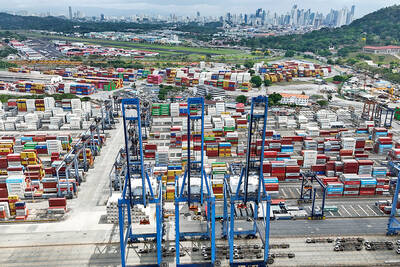Venezuelans vote for governors and mayors yesterday in elections seen as a popularity test for leftist President Hugo Chavez, one year after the anti-US leader lost a referendum on extending his authority. Polls showed Chavez’s United Socialist Party of Venezuela (PSUV) would likely hold most states and cities, but could lose some posts as voters express concern over escalating crime, corruption and inefficiency.
Chavez, in power for almost 10 years, has crossed the country campaigning for his party’s candidates, ensuring that the polls will also test support for him and his socialist revolution.
Still popular among the majority poor for spending oil wealth on schools, clinics and subsidized food, Chavez needs his allies to score a decisive win to build a platform to push reforms that would allow him to seek re-election in 2012.
“My destiny is at stake ... Whether Chavez keeps governing Venezuela will depend on what happens on Nov. 23,” the president said recently.
The government’s failure to control crime and inflation — which helped the opposition defeat the referendum proposing that Chavez be allowed to run for re-election — are voters’ main concerns.
“These elections will be the first important test of the regime’s political and social clout and remaining political capital” since the referendum loss, Goldman Sachs’ senior economist Alberto Ramos said.
Diverse opposition groups have meanwhile agreed to join together to increase chances for victory and run single candidates in 20 of 22 gubernatorial races and in more than 200 of 328 mayoral races.
The opposition controls two states — northwestern Zulia and northeastern Nueva Esparta — and another four are in the hands of Chavez dissidents.
Surveys showed the opposition could win between five and seven governorships in their bid to gain back some lost power.
Observers say that opposition gains in symbolic areas of the oil-rich OPEC country such as Caracas or big states his allies have controlled for years would do the most damage.
Famous for his fiery language, Chavez has threatened to imprison opponents, or even send tanks onto the streets if his party loses in the populous northwestern state of Carabobo.
Local and regional police will be off duty to cede polling day control to some 140,000 soldiers.
Some 300 candidates, mainly from the opposition, have been prevented from running in the elections.
Chavez, 54, led a failed military coup in 1992 and was briefly overthrown for two days in April 2002.
But until last year’s narrow referendum loss, the outspoken anti-liberal — popular among the country’s majority poor who he has helped with social programs — had always emerged from polls with convincing victories. Many say that, despite last year’s referendum defeat, the firebrand leader is still seeking to change the constitution in a bid to stay in office beyond 2013 when his second six-year term will end.
About 17 million Venezuelans are eligible to vote.

THE TRAGEDY OF PUNCH: Footage of the seven-month-old Japanese macaque has gone viral online after he was rejected by his mother and formed a bond with a soft toy A baby monkey in Japan has captured hearts around the world after videos of him being bullied by other monkeys and rejected by his mother went viral last week. Punch, a Japanese macaque, was born in July last year at Ichikawa City Zoo. He has drawn international attention after zookeepers gave him a stuffed orangutan toy after he was abandoned by his mother. Without maternal guidance to help him integrate, Punch has turned to the toy for comfort. He has been filmed multiple times being dragged and chased by older Japanese macaques inside the enclosure. Early clips showed him wandering alone with

Australian Prime Minister Anthony Albanese yesterday said he did not take his security for granted, after he was evacuated from his residence for several hours following a bomb threat sent to a Chinese dance group. Albanese was evacuated from his Canberra residence late on Tuesday following the threat, and returned a few hours later after nothing suspicious was found. The bomb scare was among several e-mails threatening Albanese sent to a representative of Shen Yun, a classical Chinese dance troupe banned in China that is due to perform in Australia this month, a spokesperson for the group said in a statement. The e-mail

TENSIONS: The march went ahead without clashes, but arrests were still possible as police investigate suspects behind Nazi salutes, racist slurs and homophobic insults Thousands of people on Saturday marched in southeastern France under heavy security in tribute to a far-right activist whose killing, blamed on the hard left, has put the country on edge. The crowd — many wearing black and some covering their lower faces with masks — marched through the city of Lyon carrying flowers and placards bearing pictures of Quentin Deranque and the words: “justice for Quentin” and “the extreme left kills.” The 23-year-old died from head injuries following clashes between radical left and far-right supporters on the sidelines of a demonstration against a politician from the left-wing France Unbowed

‘OCCUPATION’: Hong Kong said it had lodged ‘stern protests’ with Panama’s consulate, and would ‘staunchly support’ the rights and interests of Hong Kong companies Panamanian President Jose Raul Mulino on Monday ordered the temporary occupation of two ports run by a unit of CK Hutchison Holdings Ltd following the Supreme Court’s ruling against the firm’s concession, escalating a dispute that has become a proxy battle between the US and China in Latin America. Mulino said in a speech that the administration and operation of the two ports on the strategic Panama Canal is to revert to the country’s National Maritime Authority to ensure their uninterrupted, safe and efficient operation. The occupation covers movable equipment at the ports and does not mean a definitive loss of